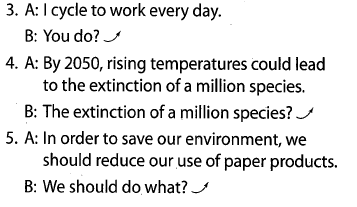Unit 6 : Global Warming?
Language
*Objectives
By the end of the lesson, students will be able to:
1.Knowledge
Vocabulary: words and phrases related to global warming
Pronunciation: intonation in yes-no questions and echo-questions
Grammar: perfect gerunds and perfect participles
2.Skills
develop Listening, speaking, writing, reading skills
3.Attitude
– be aware of the need to solve the global warming problem.
VOCABULARY
Complete the sentences with the right form of the words/phrases from 3 in GETTING STARTED. (Hoàn thành những câu dưới đây bằng cách chọn dạng đúng của từ/cụm từ đã gặp ở hoạt động 3 phần GETTING STARTED.)
1.carbon footprint
2. infectious diseases
3.emissions
4. ecological balance
5.heat-related illnesses
6. climate change
PRONUNCIATION
Intonation on yes-no questions and echo questions (Ngữ điệu trong câu hỏi yes-no và câu hỏi lặp lại.)
Bài 1. Listen and repeat these sentences, paying attention to their rising intonation (Hãy nghe và lặp lại những câu này, chú ý tới ngữ điệu lên trong các câu.)
Click tại đây để nghe:
Câu hỏi yes-no là những câu hỏi không có từ để hỏi như who, whose, when, where. Why, what và how. Sử dụng ngữ điệu lên với loại câu hỏi này.
1.Do you agree with me?
2.Can you talk about the effects of global warming?
3.Do you think that we can reduce our carbon footprint?
4.Is it true that global warming is getting worse?
5.Are most of the environmental problems caused by humans?
Bài 2. Listen and mark / (rising intonation) on the echo questions. Then practise read the exchanges. (Hãy nghe và đánh dấu mũi tên lên thể hiện ngữ điệu lên của những hỏi lặp lại. Tập đọc các mẩu hội thoại dưới đây.)
Click tại đây để nghe:


GRAMMAR
Bài 1. Work in pair. Underline the perfect participles in the sentences in 4 in GETTING STARTED. Then rewrite the sentences using after/then or because/since. (Làm bài tập theo cặp. Gạch chân các perfect participles trong những câu ở mục 4 phần GETTING STARTED. Sau đó viết lại câu. sử dụng after/then hoặc be cause/since. )
– Having planned the content, we’re now looking for supporting information.—> After we have planned the content, we re now looking for supporting information. (Mệnh đề chi thời gian)
– Having treated the environment irresponsibly, humans now have to suffer.
—> Because/Since humans have treated the environment irresponsibly, they now have to suffer.
(Mệnh đề chỉ lý do)
Bài 2. Match the two parts to make complete sentences. (Ghép hai mệnh đề thích hợp để xây dựng câu hoàn chỉnh.)
1.e
2. c
3. a
4. b
5.g
6. h
7. f
8. d
Rewrite the sentences using perfect participle. (Viết lại các câu trên, sử dụng perfect participle.)

Perfect gerunds (Danh động từ hoàn thành)
Hình thức:
Chủ động: Having + Past participle (Quá khứ phân từ)
Bị động: Having been + Past participle (Quá khứ phân từ)
Chúng ta dùng Perfect gerunds (Danh động từ hoàn thành) thay cho hình thức hiện tại của danh động từ khi muốn nhấn mạnh một hành động đã xáy ra trong quá khứ trước hành động của động từ chính trong câu. Có thể dùng Periect gerunds sau các động từ chính với các cấu trúc sau:
(1) Verb + (ob ject) + preposition + perfcct gerund
Động từ:
Apologise for, accuse someone of. admire someone for, blame some one/somethin? for, congratulate someone on, criticise someone/something for, punish someone for, praise someone for, thank someone for, suspect someone of
Ví dụ: He blamed me for not having cooked dinner.
(1) Verb + perfect gerund
Động từ:
Admit, deny, forget, mention, remember, recall, recall regret
Ví dụ: I regret not having met him earlier in my life.
Lưu ý: Tuỳ vào ngữ cảnh chúng ta có thể sử dụng danh động từ đơn hay danh động từ hoàn thành. Trong một số trường hợp chúng ta có thể thấy rõ hành động nào xảy ra trước và vi thế chúng ta chỉ cần sử dụng danh động từ đơn mà không cần dùng danh động từ hoàn thành để nhấn mạnh.
Ví dụ: She denied breaking the flower vase.
Combine the sentences using perfect gerunds. (Dùng perfect gerunds để nối các câu đơn lại với nhau.)
Ví dụ :
Someone had started a fire in the forest. Tom admitted that he had done it.
—> Tom admitted (to) having started a fire in the forest.
Key
1.The students in Group 11G were praised for having planted the most trees in the schoolyard in the Tree Planting Competition.
2.The police suspected Mike of having cut down the oldest tree in the park.
3.He denied having dumped lots of rubbish onto the beach.
4.Thank you for having saved the lives of hundreds of wild animals.
5.They regretted having hunted and killed many wild animals.
6.The factory was heavily fined for having dumped tons of toxic waste into the river.
7.Denis was rewarded for having taken an active part in the Green Summer activities.




Comments mới nhất